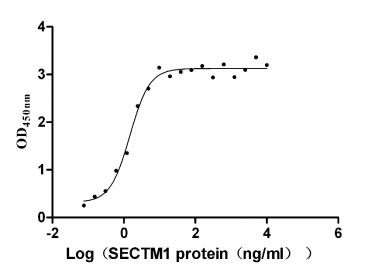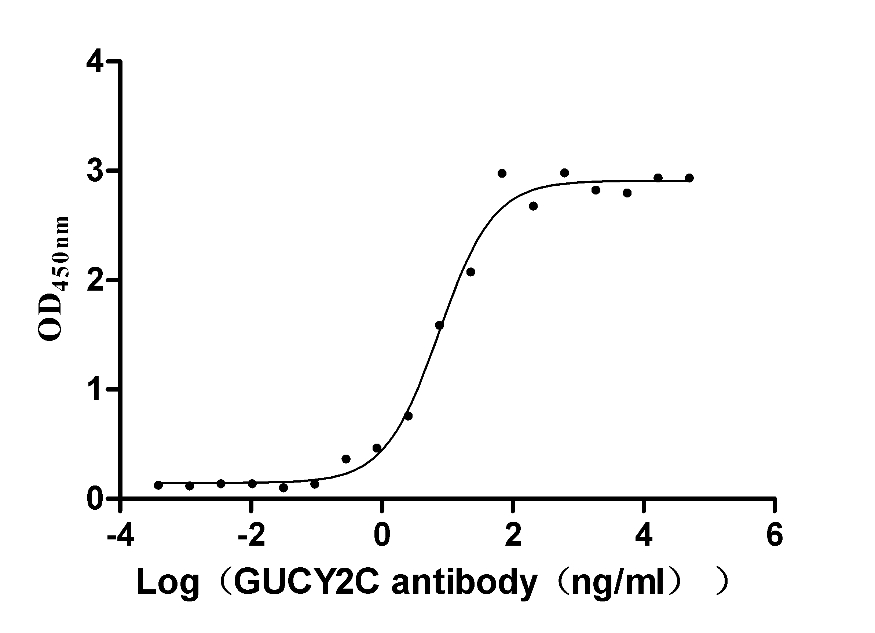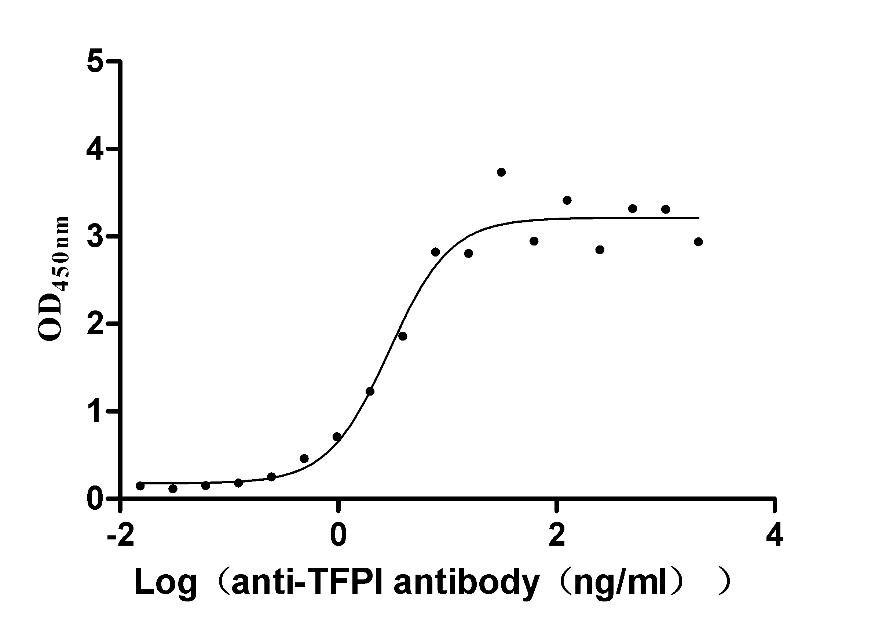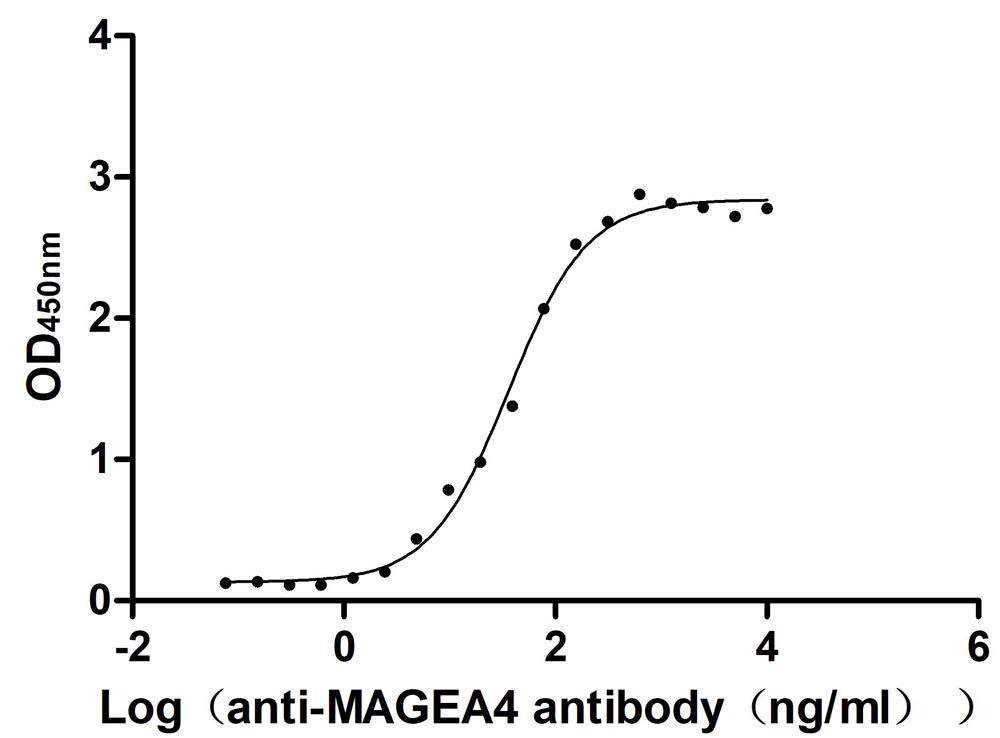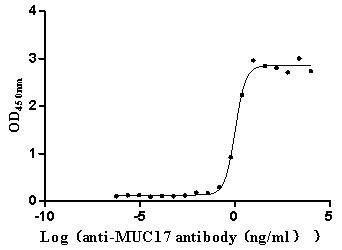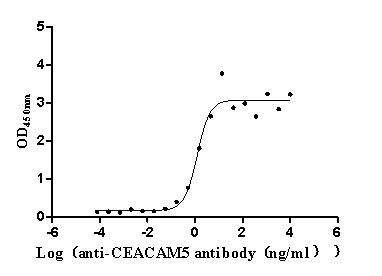Recombinant Human Monocarboxylate transporter 8 (SLC16A2), partial
-
中文名称:人SLC16A2重组蛋白
-
货号:CSB-YP021409HU
-
规格:
-
来源:Yeast
-
其他:
-
中文名称:人SLC16A2重组蛋白
-
货号:CSB-EP021409HU
-
规格:
-
来源:E.coli
-
其他:
-
中文名称:人SLC16A2重组蛋白
-
货号:CSB-EP021409HU-B
-
规格:
-
来源:E.coli
-
共轭:Avi-tag Biotinylated
E. coli biotin ligase (BirA) is highly specific in covalently attaching biotin to the 15 amino acid AviTag peptide. This recombinant protein was biotinylated in vivo by AviTag-BirA technology, which method is BriA catalyzes amide linkage between the biotin and the specific lysine of the AviTag.
-
其他:
-
中文名称:人SLC16A2重组蛋白
-
货号:CSB-BP021409HU
-
规格:
-
来源:Baculovirus
-
其他:
-
中文名称:人SLC16A2重组蛋白
-
货号:CSB-MP021409HU
-
规格:
-
来源:Mammalian cell
-
其他:
产品详情
-
纯度:>85% (SDS-PAGE)
-
基因名:SLC16A2
-
Uniprot No.:
-
别名:AHDS; DXS 128; DXS 128E; DXS128; DXS128 E; DXS128E; MCT 7; MCT 8; MCT7; MCT8; Monocarboxylate transporter 7; Monocarboxylate transporter 8; MOT 8; MOT8_HUMAN; MRX 22; MRX22; SLC16 A2 ; SLC16A 2; SLC16A2; Solute carrier family 16 (monocarboxylic acid transporters), member 2; Solute carrier family 16 member 2; Solute carrier family 16, member 2 (monocarboxylic acid transporter 8) ; Solute carrier family 16, member 2 (thyroid hormone transporter); Solute carrier family 16, member 2; X linked PEST containing transporter; X-linked PEST-containing transporter; XPCT
-
种属:Homo sapiens (Human)
-
蛋白长度:Partial
-
蛋白标签:Tag type will be determined during the manufacturing process.
The tag type will be determined during production process. If you have specified tag type, please tell us and we will develop the specified tag preferentially. -
产品提供形式:Lyophilized powder
Note: We will preferentially ship the format that we have in stock, however, if you have any special requirement for the format, please remark your requirement when placing the order, we will prepare according to your demand. -
复溶:We recommend that this vial be briefly centrifuged prior to opening to bring the contents to the bottom. Please reconstitute protein in deionized sterile water to a concentration of 0.1-1.0 mg/mL.We recommend to add 5-50% of glycerol (final concentration) and aliquot for long-term storage at -20℃/-80℃. Our default final concentration of glycerol is 50%. Customers could use it as reference.
-
储存条件:Store at -20°C/-80°C upon receipt, aliquoting is necessary for mutiple use. Avoid repeated freeze-thaw cycles.
-
保质期:The shelf life is related to many factors, storage state, buffer ingredients, storage temperature and the stability of the protein itself.
Generally, the shelf life of liquid form is 6 months at -20°C/-80°C. The shelf life of lyophilized form is 12 months at -20°C/-80°C. -
货期:Delivery time may differ from different purchasing way or location, please kindly consult your local distributors for specific delivery time.Note: All of our proteins are default shipped with normal blue ice packs, if you request to ship with dry ice, please communicate with us in advance and extra fees will be charged.
-
注意事项:Repeated freezing and thawing is not recommended. Store working aliquots at 4°C for up to one week.
-
Datasheet :Please contact us to get it.
相关产品
靶点详情
-
功能:Very active and specific thyroid hormone transporter. Stimulates cellular uptake of thyroxine (T4), triiodothyronine (T3), reverse triiodothyronine (rT3) and diidothyronine. Does not transport Leu, Phe, Trp or Tyr.
-
基因功能参考文献:
- MCT8 and TSHR form heteromers. PMID: 29290039
- Our results highlight the potential role of MCT8 in thyroid hormone transport for human oligodendrocytes development and may implicate DITPA as a promising treatment for developmentally-regulated myelination in Allan-Herndon-Dudley syndrome PMID: 29111262
- Our findings illustrate that different mutations affecting the same residue may have a differential impact on SLC16A2 transporter function, which translates into differences in severity of the clinical phenotype. PMID: 27805744
- the aim of this study was to examine if MCT8 and MCT10 increase the availability of triiodothyronine for its nuclear receptor. PMID: 27492966
- Data provide evidence for a role of the long N-terminus of MCT8 as target of ubiquitin-dependent proteasomal degradation affecting MCT8 amount and subsequently oligomerization capacity. PMID: 27222294
- findings provide insights into Monocarboxylate transporter 8(MCT8) structure and function, which add to our understanding of the pathogenic mechanism of mutations found in patients who have Allan-Herndon-Dudley syndrome (AHDS) PMID: 28977587
- Down-regulation of MCT8 in thyroid cancers qualifies MCT8 as a marker of thyroid differentiation. PMID: 28576880
- MCT8 Mutation is associated with Allan-Herndon-Dudley Syndrome. PMID: 26426690
- brain damage in MCT8 deficiency is diffuse, without evidence of focal lesions, and present from fetal stages despite apparent normality at birth PMID: 25222753
- Specific mutations of MCT8 located in transmembrane helix 2 (del230F, V235M, and ins236V) increase the capacity of MCT8 variants to dimerize. PMID: 25527620
- we report 4 Allan-Herndon-Dudley syndrome patients in unrelated Turkish families harboring novel MCT8 mutations PMID: 25247785
- two SNPs in MCT8 were related to circulating thyroid hormone levels in men but not in women: the rs5937843 polymorphism (G/T) was inversely associated with FT4 levels and the rs6647476 (T/C) polymorphism related negatively to circulating FT3 PMID: 23978482
- A reduction in MCT8 expression in the intrauterine growth retardation fetal brain could further compromise Thyroid hormone-dependent brain development. PMID: 24204008
- We describe three new SLC16A2 mutations associated with different levels of clinical severity in patients with psychomotor retardation disorders. PMID: 23568789
- Monocarboxylate transporter 8 modulates the viability and invasive capacity of human placental cells and fetoplacental growth in mice. PMID: 23776477
- A boy with Allan-Herndon-Dudley syndrome and his heterozygous mother had a point mutation in exon 3 of the MCT8 gene 1201G>A:G401R which changes the properties of the protein. PMID: 23744248
- MCT8 mutations in Allan-Herndon-Dudley Syndrome patients may have tissue-specific effects on thyroid hormone transport. PMID: 23550058
- study reports a family with two patients affected by Allan-Herndon-Dudley syndrome in two consecutive generations with a c.670 G->A, p.A224 mutation in the MCT8 gene PMID: 23419639
- 3 males patients with marked delayed brain myelination and in which the clinical picture was dominated by early onset nonparoxysmal extrapyramidal symptoms. In one subject a novel mutation is described. PMID: 22805248
- Results indicate that His192 is sensitive to modification by DEPC and may be located close to a putative substrate recognition site within the MCT8 protein, important for efficient TH uptake. PMID: 23610131
- Importance of cysteine residues in the thyroid hormone transporter MCT8. PMID: 23546606
- This study indicates that MCT8 mutations are a relatively frequent cause of X-linked mental retardation. PMID: 22924588
- nonsense mutation in MCT8 (c.1102A-->T (p.R368X)) was identified in the proband causing X-linked leucoencephalopathy PMID: 21415082
- Our results implicate peripheral deiodination in the peculiar hormonal constellation of MCT8-deficient patients PMID: 21813593
- From the early first trimester, immunohistochemistry localised MCT8 to the microvasculature and to undifferentiated CNS cells in the cerebral cortex. However, human NT2 cell neurodifferentiation is not dependent upon triiodothyronine or MCT8. PMID: 21486766
- monocarboxylate transporter 8 facilitates bromoacetyl [(125)I] iodothyronine transport, but is not labeled by it PMID: 21315799
- Group-by-genotype interactions for 2 highly correlated SNPs (rs496549 & rs479640) revealed co-localised association clusters in the left occipital cortex. PMID: 21208750
- findings demonstrate a potential link between FUS mutations and cellular pathways involved in stress responses that may be relevant to altered motor neuron homeostasis in ALS PMID: 20705735
- Increased monocarboxylate transporter 8 expression and intracellular T(3) accumulation may contribute to the altered T(3) responsiveness of IUGR cytotrophoblasts. PMID: 20660035
- structural model and functional data PMID: 20628049
- Data show that SLC16A2 involvement should be considered in males with learning disability, an associated motor or movement disorder, and evidence of delayed myelination on brain MRI. PMID: 19811520
- Increased MCT8 and decreased MCT10 expression within placentae of pregnancies complicated by IUGR may contribute to aberrant development of the fetoplacental unit. PMID: 20167367
- Thigh subcutaneous adipose tissue from subjects with familial partial lipodystrophy 2 has lower expression of MCT8 and activity than abdominal SAT, suggesting that changes in local thyroid hormone metabolism may occur in areas with lipoatrophy. PMID: 20373986
- The finding that the cell type determines surface expression and T(3) transport activities of missense mutants in MCT8 may be important to understand phenotypic variability among carriers of different mutations. PMID: 19648159
- Association between mutations in MCT8, a thyroid hormone transporter, and severe X-linked psychomotor retardation PMID: 15488219
- MCT8 plays an important role for proper central nervous system development by transporting TH into neurons as its main target cells. PMID: 15661862
- X-linked paroxysmal dyskinesia and severe global retardation caused by defective MCT8 gene. PMID: 15834651
- Abnormal transporter function is reflected in elevated free triiodothyronine and lowered free thyroxine levels in the blood. Infancy and childhood in the Allan-Herndon-Dudley syndrome are marked by hypotonia, weakness, reduced PMID: 15889350
- hMCT8 mediates plasma membrane transport of iodothyronines, thus increasing their intracellular availability. PMID: 16887882
- The SLC16A2 (formerly MCT8) gene is located on chromosome Xq13.2 and has recently been associated with a syndrome combining severe, X-linked, psychomotor retardation and high serum T3 levels. PMID: 16957765
- findings support the hypothesis that the severe psychomotor retardation and elevated serum T3 hormone levels in these patients are caused by inactivation of the MCT8 transporter, preventing action and metabolism of T(3) in central neurons PMID: 17356046
- MCT8 plays an important role in the development of the central nervous system by transporting thyroid hormone into neurons as its main target cells. (Review) PMID: 17684393
- Mutants L434W, L568P, and S194F showed significant residual transport capacity, which may underlie the more advanced psychomotor development observed in patients with these mutations. PMID: 18187543
- MCT10 is at least as active a thyroid hormone transporter as hMCT8, and that both transporters facilitate iodothyronine uptake as well as efflux. PMID: 18337592
- Allan-Herndon-Dudley syndrome clinical features can be present in female MCT8 mutation carriers whenever there is unfavorable nonrandom X-inactivation. PMID: 18398436
- abnormal brain development associated with MCT8 mutations may be the consequence of either decreased or increased intracellular 3,3',5-triiodothyronine concentrations. PMID: 18636565
- Data report that in addition to neuronal expression, MCT8 mRNA and protein are expressed in cerebral microvessels in human. PMID: 18687783
- The S107P single nucleotide polymorphism in SLC16A2, the gene encoding the thyroid hormone (TH)-specific transporter monocarboxylate transporter 8 (MCT8), is frequent in the male population in Galicia. PMID: 18710470
- Data show that small interfering RNA depletion of endogenous MCT8 resulted in increased cell survival and decreased T(3) uptake. PMID: 19022891
- Pelizaeus-Merzbacher-Like disease presentation of MCT8 mutated male subjects. PMID: 19194886
显示更多
收起更多
-
相关疾病:Monocarboxylate transporter 8 deficiency (MCT8 deficiency)
-
亚细胞定位:Cell membrane; Multi-pass membrane protein.
-
蛋白家族:Major facilitator superfamily, Monocarboxylate porter (TC 2.A.1.13) family
-
组织特异性:Highly expressed in liver and heart.
-
数据库链接:
HGNC: 10923
OMIM: 300095
KEGG: hsa:6567
STRING: 9606.ENSP00000276033
UniGene: Hs.75317
Most popular with customers
-
Recombinant Human T-cell antigen CD7 (CD7), partial (Active)
Express system: Mammalian cell
Species: Homo sapiens (Human)
-
Recombinant Human Heat-stable enterotoxin receptor (GUCY2C), partial (Active)
Express system: Mammalian cell
Species: Homo sapiens (Human)
-
Recombinant Rabbit Tissue factor pathway inhibitor (TFPI) (Active)
Express system: Mammalian cell
Species: Oryctolagus cuniculus (Rabbit)
-
Recombinant Human Melanoma-associated antigen 4 (MAGEA4) (Active)
Express system: Mammalian cell
Species: Homo sapiens (Human)
-
Recombinant Human Zymogen granule protein 16 homolog B (ZG16B) (Active)
Express system: Mammalian cell
Species: Homo sapiens (Human)
-
Recombinant Human Mucin-17 (MUC17), partial (Active)
Express system: Mammalian cell
Species: Homo sapiens (Human)
-
Express system: Mammalian cell
Species: Homo sapiens (Human)


